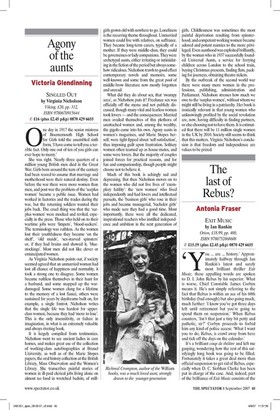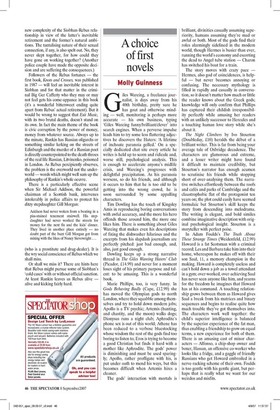The last of Rebus?
Antonia Fraser EXIT MUSIC by Ian Rankin Orion, £18.99, pp. 400, ISBN 9780752868608 £15.19 (plus £2.45 p&p) 0870 429 6655 y ‘ 0u... are ... history.' Appro i xmately halfway through Ian Rankin's latest and surely most brilliant thriller Exit Music, these appalling words are spoken to D. I. John Rebus by his superior. What is worse, Chief Constable James Corbyn means it. He's not simply referring to the fact that Rebus is within an ace of his 60th birthday (bad enough) but also going much, much further: 'I know you've got three days left until retirement but you're going to spend them on suspension.' When Rebus counters, 'Isn't that just a tiny bit petty and pathetic, sir?' Corbyn proceeds to forbid him any kind of police access: 'What I want you to do, Rebus, is crawl away from here and tick off the days on the calendar.'
It's a brilliant coup de theatre and left me gasping, wondering how the rest of this satisfyingly long book was going to be filled. Fortunately it takes a great deal more than official suspension to get rid of Rebus, especially when D. C. Siobhan Clarke has been put in charge of the case. And, indeed, part of the brilliance of Exit Music consists of the new complexity of the Siobhan-Rebus relationship in view of the latter's inevitable retirement and the former's natural ambitions. The tantalising nature of their sexual connection, if any, is also spelt out. No, they never slept together, for how could they have gone on working together? (Another police couple have made the opposite decision and are suffering the consequences.) Followers of the Rebus fortunes — the first book, Knots and Crosses, was published in 1987 — will feel an inevitable interest in Siobhan and for that matter in the criminal Big Ger Cafferty who they may or may not feel gets his come-uppance in this book (it's a wonderful bittersweet ending quite apart from Rebus' actual retirement). But it would be wrong to suggest that Exit Music, with its two brutal deaths, doesn't stand on its own. In fact the main theme of the book is civic corruption by the power of money, money from whatever source. Always up to the minute, Rankin has Russian oligarchs or something similar lurking on the streets of Edinburgh and the murder of a Russian poet is directly counterpointed to the death throes of the real life Russian, Litvinenko, poisoned in London. As Rebus percipiently observes, the problem is the overworld not the underworld — words which might well sum up the philosophy of Rankin's whole oeuvre.
There is a particularly effective scene when Sir Michael Addison, the powerful chairman of a Scottish bank, intervenes intolerably in police affairs to protect his ditzy stepdaughter Gill Morgan: Addison had never woken from a beating in a piss-stained tenement stairwell. His stepdaughter had never worked the streets for money for the next fix and the kids' dinner. They lived in another place entirely — no doubt part of the buzz Gill Morgan got from mixing with the likes of Nancy Sievewright (who is a prostitute and drug-dealer). It is the wry social conscience of Rebus which we shall miss.
Or shall we miss it? There are hints here that Rebus might pursue some of Siobhan's 'cold cases' with or without official sanction. At least Rankin leaves us Rebus alive — alive and kicking fairly hard.




































































 Previous page
Previous page